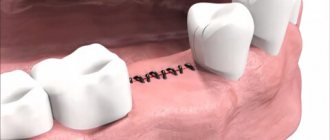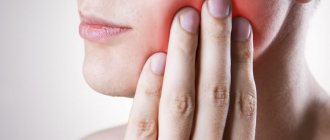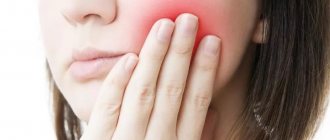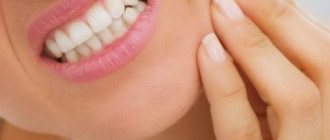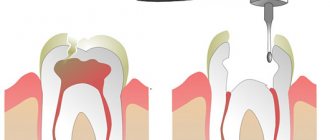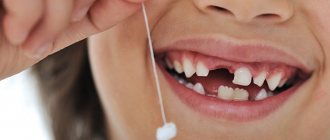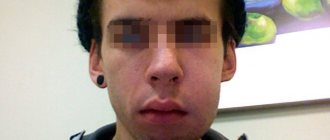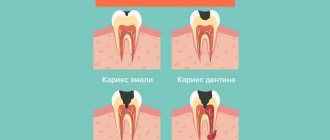Functions of the sky and structural features
The palate is a vault that separates the oral cavity from the nasopharynx. The structure of the palate consists of two sections - hard and soft. This organ performs an important function - it prevents food from entering the nasopharynx from the oral cavity.
In addition, receptors on the surface of the palate are associated with the larynx and take part in articulation and influence the timbre of the voice and the pitch of sounds. Thus, the inflammatory process of the upper palate disrupts all the functions of this important organ, and therefore requires mandatory treatment.
Treatment
The main goal is to stop the acute condition and prevent complications. Mandatory treatment of alcohol dependence, the appointment of gentle nutrition and drug therapy. Medicines are symptomatic therapy aimed at relieving the manifestations of the disease:
- Painkillers, antispasmodics - to reduce pain and alleviate the condition, such as drotaverine, no-shpa, spazgan;
- Anti-inflammatory drugs – denol, pepto bismol;
- Antacids - Maalox, Gastal, Rennie. When the acidity content is higher than normal, they help get rid of heartburn and belching;
- Enzyme preparations for low acidity - limontar, prozerin;
- Gastroprotectors for the regeneration of mucous membranes;
- For severe dehydration, infusion of aqueous saline solutions combined with vitamins is used.
As a stimulating therapy in combination with medications, it is advisable to use folk remedies. Fresh carrot juice, cabbage juice and sage infusions promote healing of the lining of the gastrointestinal tract.
Why does inflammation occur?
The muscular structure of the palate is covered on top with a mucous membrane, which is subject to the development of an inflammatory process. Inflammation often occurs under the influence of such factors:
- burn of the mucous membrane as a result of consuming excessively hot food and drinks;
- damage to the palate due to dental diseases - periodontitis, stomatitis, caries, pulpitis;
- disruption of the oral environment due to the action of metals - when wearing braces or installing crowns;
- smoking;
- allergic reactions to medications;
- neurological diseases affecting the joints of the upper or lower jaw;
- osteomyelitis - an infectious lesion of the bone tissue of the jaw;
- malignant neoplasms;
- infectious diseases of the upper respiratory tract - sore throat, tonsillitis, pharyngitis, rhinitis.
The development of the inflammatory process of the palate may be facilitated by some of these causes in their entirety or separately from each other.
Complications
The consequences of delayed treatment are complications that lead to irreversible deformations, which are more difficult to deal with than with the initial stages of development.
A person neglects to visit a gastroenterologist, but the symptoms subside, creating the impression that everything went away on its own. But in reality it is different, and this means the development of erosion processes on the walls. This quickly leads to bleeding, leading to death. Ulcers also form on the mucous membranes. This is a common cause of destruction of blood vessels. A sign of intestinal bleeding will be dark liquid stools, speckles of blood in the feces, and if the upper part of the intestinal tract is damaged, bloody, foamy vomit, the color of coffee grounds, will occur. Blood loss leads to iron deficiency anemia and vitamin B12 deficiency.
Gastritis can provoke inflammation of the pancreas, and a dangerous, painful process develops - pancreatitis. The gallbladder can also become inflamed - cholecystitis, the duodenum - duodenitis;
With a constant lack of appetite, anorexia develops, rapid weight loss, and exhaustion.
Also, without timely seeking medical help, there is a risk of developing oncological pathologies, especially with a burdened hereditary predisposition.
Signs and symptoms of inflammation of the palate
Depending on the causes of inflammation in the oral cavity, a person may experience the following unpleasant symptoms:
- A feeling of acute pain that makes it difficult to eat. Soon the pain increases, sometimes even swallowing becomes impossible.
- If the inflammation is caused by the action of a fungus, a white coating and erosion forms on the surface of the palate. The process is accompanied by an unpleasant putrid odor from the mouth.
- When the cause of inflammation is an infectious lesion - sore throat or tonsillitis, the palate becomes red and swollen.
- In case of acute inflammation, an increase in body temperature and fever is possible.
- If the cause is dental disease, the patient will be bothered by toothache.
- With cancer, the patient complains of aching pain in the palate.
The most common oral diseases
Catarrhal stomatitis
Diagnosed in adults and children in most cases. Its development can be provoked by: insufficient hygiene, plaque and gum disease, oral dysbiosis, any diseases of the gastrointestinal tract (gastritis, colitis, duodenitis) and damage to the body by helminths.
It will be difficult for a person far from medicine to distinguish one disease from another. The symptoms of most of them are almost the same.
Symptoms of catarrhal stomatitis:
- Swelling of the oral mucosa;
- Whitish or yellowish coating;
- Increased sensitivity and soreness of tissues;
- Increased salivation;
- Bleeding gums;
- Bad breath.
Ulcerative stomatitis
A fairly serious disease of the oral mucosa. It can develop independently or as a complication after catarrhal stomatitis. Often this disease is diagnosed in people suffering from stomach ulcers or an acquired form of enteritis. In addition, the appearance of ulcerative stomatitis can be provoked by infectious, cardiovascular diseases, blood diseases and intestinal infections. Ulcerative stomatitis is active not only in the upper layer of the oral mucosa, but also spreads throughout its entire thickness. The symptoms are initially similar to catarrhal stomatitis, but then they intensify and are complemented by others.
Symptoms of ulcerative stomatitis:
- Increase in body temperature to 37.5 degrees;
- The appearance of ulcers on the inside of the cheek;
- Impotence;
- Headache;
- Painful enlargement of lymph nodes.
Aphthous stomatitis
It mainly develops due to weakened immunity, diseases of the gastrointestinal tract and allergies. In addition, viral infections or rheumatism can trigger the occurrence of aphthous stomatitis. It is worth noting that the exact causes of this disease are unknown to medicine.
Symptoms of aphthous stomatitis:
- The appearance of small red round ulcers on the oral mucosa. Over time, the center of the ulcer becomes grayish-yellow;
- General malaise;
- Temperature increase;
- Weakness.
Glossitis
Otherwise, a tumor (inflammation) of the tongue. Can be primary or secondary. It is often a companion to stomatitis of any form. The disease is dangerous because it can be complicated by abscessation of the tongue and the development of phlegmon of the neck. The chronic form of glossitis leads to the development of papillomatous, warty and other growths on the tongue. There are different types of this disease, which are similar in their main symptoms:
- Pain and swelling of the tongue;
- Red spots on the surface of the tongue;
- Redness of the pharynx, tonsils;
- Rash and sores.
Leukoplakia
Chronic disease of the oral mucosa. It hardly bothers the patient and has a blurred clinical picture. The causes of leukoplakia are traumatic in nature. It mainly affects older men. It is located on the mucous membrane of the cheeks, in the corners of the mouth and on the lateral surfaces of the tongue. The occurrence of this disease is provoked by mechanical damage to the mucous membrane: burns from too hot or spicy food, friction with the tops of broken teeth. The seriousness of leukoplakia is that it can degenerate into cancer, so the patient needs to consult an oncologist.
Symptoms of leukoplakia:
- Pathological keratinization of the epithelium;
- Growths are white or gray;
- Mild itching and burning.
Atrophic candidiasis
The disease affects newborn children, men who smoke, women of childbearing age and the elderly. As a rule, this pathology manifests itself in an acute form. The disease is difficult for patients to tolerate and significantly reduces the quality of life. A person experiences discomfort while eating, and is bothered by a burning sensation and itching.
Symptoms of atrophic candidiasis:
- Dryness and redness of the mucous membrane;
- Whitish coating in the folds of the mouth.
Lichen
This disease can affect not only the skin, but also the oral mucosa. The acute form lasts within a month, and the moderate-acute form lasts up to six months. In cases where lichen lasts for a long time, we are talking about a chronic form of the disease. In older people, oral lichen manifests itself in the form of erosions and numerous ulcers. In addition, rashes in the form of blisters may appear on the reddened mucous membrane. This disease mainly affects people who have a history of diabetes, weakened immunity, and various diseases of the liver and gastrointestinal tract. In some cases, there is a hereditary predisposition.
Symptoms of oral lichen:
- Plaques on the surface of the mucosa;
- Discomfort while eating;
- Itching and burning.
Dysbacteriosis
Most often, long-term antibiotic therapy leads to the formation of this pathology, which disrupts the healthy balance of microflora. If dysbiosis is not treated, it will spread further, disrupting the proper functions of the organs, completely affecting the tongue, tonsils and vocal cords. Most patients develop periodontal disease, which can lead to loosening and tooth loss.
Symptoms of dysbiosis of the oral mucosa:
- Unpleasant odor;
- Bleeding cracks in the corners of the mouth;
- Heavy plaque.
Cheilitis
The disease manifests itself not only from the inside, but also from the outside. The reasons lie in changes in hormonal balance, allergies, lack of vitamins, and the effect of fungal flora on the mucous membrane.
Symptoms of cheilitis:
- Inflammation of the lip border;
- Ulcers on the oral mucosa.
How is inflammation of the palate treated?
How to treat inflammation on the roof of the mouth, a specialist will tell you after determining the diagnosis. The following therapy methods can be used:
- If the cause of inflammation is minor damage to the mucous membrane, rinsing with decoctions of medicinal herbs is usually sufficient. Decoctions and infusions based on calendula, sage and chamomile have an antiseptic and healing effect. The herbal decoction for rinsing should be used warm.
- When the palate is affected by a fungus, patients are prescribed topical agents. The most effective are the solution and gel “Chlorhexidine”, “Rotokan” or “Stomatofit”.
- In case of severe pain symptoms, regardless of the cause of inflammation, drugs of combined action are prescribed. “Cholisal-gel” and “Kalgel” have proven themselves well.
- If a purulent inflammatory process is detected in the oral cavity, the patient is prescribed antibiotics. The minimum course of treatment is usually 7 days, but there are also stronger drugs that only need to be taken for 3 days. Along with local agents, antibacterial drugs for internal use - Sumamed, Flemoxin Solutab - can be prescribed.
- The inflammatory process of the palate is easily treatable. The earlier therapy is carried out, the less likely it is to develop complications.
Diagnostics
Before treating the disease, a thorough examination is necessary. The doctor needs to be sure that this gastritis arose precisely from the consumption of alcoholic beverages, since there are other types of this disease. And it is necessary to distinguish it in order to prescribe precise therapy.
The examination begins with interviewing the patient, listening to his complaints, asking about heredity and frequency of drinking alcohol. Next, a visual examination of the appearance is performed - with gastritis, the skin is flabby, and upon palpation there is pain in the abdominal area.
Blood is donated to a clinical laboratory for a general blood test, where the process of inflammation increases the number of leukocytes and the erythrocyte sedimentation rate. An increase in ESR means blood thickening due to dehydration, which causes frequent vomiting and diarrhea. The causative agent of the disease, Helicobacter pylori, is detected in stool, blood or a breath test. During FGSD, using a probe with a camera, the condition of the mucous tissues of the stomach, esophagus and duodenum is assessed and material is collected for histological examination. Additionally, an ultrasound of the abdominal organs and an x-ray are prescribed.
Prevention measures
Preventive measures come down to following simple rules:
- brush your teeth at least twice a day; - use mouth rinses every time after meals; - Avoid eating excessively hot food; — enrich the diet with vitamins and microelements to increase local immunity.
Elimination of stressful situations, a balanced diet, regular visits to the dentist and examination of the body - all these actions are reliable prevention of the development of inflammatory processes in the oral cavity.
How to treat inflammation of the palate depends on the causes of the development of the inflammatory process and its symptoms. To determine an accurate diagnosis, you should visit the dentist's office.
This article is for informational purposes only, please consult your doctor for details!
Prevention and prognosis
Once treatment is started, especially in young people, it is not difficult and quick. The prognosis is favorable in the absence of severe complications, such as transition to oncology.
Prevention before the onset of a disease includes a healthy lifestyle - giving up bad habits, smoking, and giving up alcohol. Rational, regular, nutritious nutrition containing microelements and vitamins necessary for health, reducing to a minimum the need to use medications.
Secondary prevention, that is, after recovery, includes complete abstinence from alcohol-containing drinks, adherence to the prescribed diet, and examination by a gastroenterologist at least once every two years.
Thus, alcoholic gastritis is an easily avoidable disease. There are no moments in life's journey where it is under no circumstances possible to replace alcohol with non-alcoholic drinks. But even if this rule is violated, going to the hospital on time and ensuring a further healthy life after recovery is not difficult.
Author of the article: Yakovlev Evgeniy Anatolyevich
Narcologist, Candidate of Medical Sciences.
